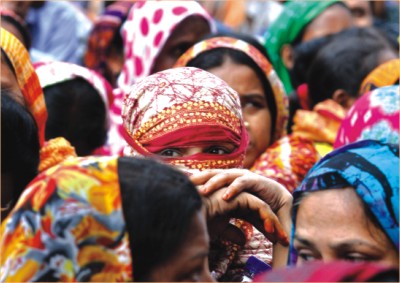
Inside
|
Roll play Badiul Alam Majumdar details the machinations of the Election Commission with respect to the electoral roll that have caused it to fall into such disrepute
After becoming the chief election commissioner last year, Justice MA Aziz stated publicly that the Electoral Rolls Ordinance, 1982 allows only revision of the electoral roll, and preparing it afresh would require amending the law. Nevertheless, the EC, under his chairmanship, decided in its meeting of August 6, 2005 to prepare a fresh electoral roll to make it "completely error free." The EC's decision was questionable at best. Subsequently, the two election commissioners, MM Munsef Ali and AK Mohammad Ali stated publicly that the decision to prepare a fresh electoral roll was taken unilaterally by the CEC over their objections. But the EC is a composite body and the commissioners must make decisions either unanimously, or in case of difference of opinion, by a majority vote. Later, three members of parliament filed two writ petitions before the High Court Division of the Bangladesh Supreme Court challenging the preparation of a fresh electoral roll by the unilateral decision of the CEC. Legal provisions Section 7(7) of the Ordinance relates to the preparation of a new electoral roll. It states: "If the Commission, on account of any gross error or irregularity in or in the preparation of an electoral roll for any electoral area or constituency or draft thereof, considers it necessary so to do, it may by order direct such roll or draft shall stand cancelled and that an electoral roll for that electoral area or constituency be prepared afresh." It is clear from the above that the law gives the EC the authority to prepare a new electoral roll only for a specific electoral area or constituency. Even for such fresh preparation of the roll for a specific area or constituency, the commission has to be satisfied that there is gross error or irregularity in the roll or in its preparation. Furthermore, the decision will have to be made by the commission, not by the CEC alone, and before deciding to order the preparation of a fresh electoral roll the existing roll needs to be cancelled by the commission.
The EC appealed while continuing to prepare the new electoral roll, although the Appellate Division issued no stay on the High Court judgment. On May 23, the appellate court dismissed the appeal and upheld the earlier judgment with slight modifications. The directives of the Appellate Division amounted to declaring the new electoral roll prepared by the EC as illegal. It also once and for all settled the question of whether to prepare a new electoral roll or to revise it. The court unequivocally directed the revision of the existing electoral roll prepared in 2000. In fact, it held that the commission is in no way authorized to prepare a fresh electoral roll for all electoral areas or constituencies by scrapping the already existing roll preserved under Section 7(6) of the said Ordinance since there are provisions for amendments, corrections, and revisions of the same. In order to determine whether the EC fully complied with the court directives, one must very carefully read the judgment in conjunction with the Electoral Rolls Ordinance, 1982. Justice Amirul Kabir Chowdhury, who wrote the main judgment, directed the Election Commission to "prepare Electoral Roll taking into consideration the existing Roll under Section 7(6) of the Ordinance." He then provided a guideline to delete names from the existing roll in accordance with rule 20 and sub-rule 3 and 4 framed under the said Ordinance. The other four justices concurred with these directives. Although Justice Chowdhury provided a guideline for deletion, he offered no guidance as to how to prepare an electoral roll for the upcoming election taking into consideration the existing roll. Justice Md Tafazzul Islam remedied this void by directing that "before the 9th Parliamentary election, it is the existing electoral roll, i.e., the electoral roll of 2000, with some additions, deletions and modification as may be necessary, that is to be published as draft electoral roll." The other three justices concurred with this guideline. It is thus clear that Justice Islam's additions contain a critical supplement to the main judgment written by Justice Chowdhury. In order to understand the significance of Justice Islam's additions, one must clearly understand the stages in the preparation of the electoral roll. Justice Islam himself specified the stages as: "(1) preparation of the draft electoral roll, (2) after making addition or modification or correction in the draft electoral roll publication of the final electoral roll, (3) maintenance of the final electoral roll in the prescribed manner and keeping it open for public inspection, (4) addition, modification and correction of the final electoral roll, (5) revision of the existing electoral roll and preparation of subsequent electoral roll after revision." Justice Islam further elaborated the procedure involved in the fifth stage: "At the fifth stage in terms of Section 11 read with rule 21, unless otherwise directed by the Election Commission, before each election to an elected body, the electoral roll shall be revised and if directed by the Election Commission, the electoral roll shall also be revised in any year." Section 11(1) of the Ordinance, which related to revision, states: "The electoral roll shall, unless otherwise directed by the Commission for reasons to be recorded in writing, be revised in the prescribed manner by reference to the qualifying date before each election to an elective body." Thus, it is clear that unless otherwise decided by the commission in writing, it is mandatory by law to revise the existing electoral roll before each election to an elective body. In accordance with rule 21(1), Justice Md Tafazzul Islam directed that prior to the next parliamentary elections the existing electoral roll would have to be revised and published as a draft electoral roll for the sake of continuity. As noted earlier, the other three justices concurred with this direction. It must be noted that the publication of the draft electoral roll requires enumerators to go from door to door to collect information, and then to publish it, inviting claims and objections. Once the draft roll is published, it must be added to, modified, and corrected using the procedures laid out in Sections 7(3) rules 7 to 17 before publishing it as the final electoral roll. It is clear from the above that in order to fully abide by the SC judgment, the EC would have no alternative but to send enumerators from door to door for collecting information. In fact, even without the court judgment, it is mandatory for the commission to do so under Section 11(1) of the Ordinance.
Although the commission initially did not want to send enumerators from door to door for collecting information from the households, as required by law, it later changed its mind under pressure from all concerned. However, the commission failed to prepare a draft electoral roll using the information collected by the enumerators. The commission also prepared a supplementary electoral roll, instead of making actual changes in, and additions to, the existing roll. After completion of its revision, the commission came up with a total electoral roll with nearly 9.3 crore names, which is about 2 crore higher than the previous roll prepared in 2000. The revised roll came under severe criticism on two major practical grounds. First, the large increase in the number of voters is higher than the rate of increase in our population. Second, the number of new voters is higher than the number of people who became adult, according to the 2001 population census, after the preparation of the last electoral roll. Thus, the new electoral roll is mathematically impossible. There are also complaints that the new roll includes many fake voters and excludes many eligible voters. In addition to the practical reasons, the EC's actions are questionable on legal grounds. For example, while the commission's position is consistent with the guideline provided by Justice Amirul Kabir Chowdhury, it totally ignored the important additions made and the guideline provided by Justice Md Tafazzul Islam, with whom the other three justices concurred. It also totally disregarded the revision needed as per law (Section 11) prior to the election of an elective body. More specifically, it did not prepare a draft electoral roll, as required by law and directed by the court. Thus, the EC's decisions appear to violate both the law and the court directives. Views from the grassroots Such attitudes are reinforced by the EC's many questionable decisions and contradictory actions. EC's meaningless dialogues with many inconsequential political parties, its squandering of large sums of money on an electoral roll found illegal by the Supreme Court, large jumps in the number of voters, its unwillingness to fully implement the High Court judgment on disclosures, and even the personal idiosyncrasies of some of the commissioners are greatly responsible for its losing public confidence. Most people feel that the commissioners are not honest brokers. They cared less about preparing a dependable electoral roll and more about their egos and self-interest. Many are suspicious that the commission surreptitiously used the electoral roll found illegal by the Supreme Court in their subsequent revisions. Because receipts were not given by the enumerators who collected the information and a draft electoral roll was not published, many eligible persons are not sure whether they are indeed voters. Thus, few are confident that the EC's revised electoral roll will be acceptable enough to be used in the upcoming parliamentary elections. Conclusions The EC's actions are also inconsistent with the recent judgment of the Appellate Division. Furthermore, there are allegations that the revised roll excluded many eligible voters and included many fictitious names. Any election held with such a flawed electoral roll is bound to be legally questionable. Thus, it would be important to once more revise the existing electoral roll in accordance with both the law and the Court directives. In making the revisions, steps must also be taken to issue the voters identity cards, as per Section 11A of the Ordinance, and with technical advancements in digital photography it should not be very difficult to do so. But we are concerned that the present EC is incapable of carrying out such a revision. Many people now view the commission as a partisan body, serving certain coterie interests rather than public interests. Thus, they have lost the trust and confidence of a large proportion of our population. In fact, the EC appears to have become the biggest obstacle to free and fair elections. We therefore recommend that in order to restore public trust and confidence in the commission, the commissioners resign immediately and be replaced by competent individuals on the basis of political consensus so that we can get on with the important tasks ahead of us to hold the coming election on time. Dr Badiul Alam Majumdar is Secretary, Shujan (Shushashoner Jonno Nagorik) |

 Court judgments
Court judgments  EC decisions
EC decisions